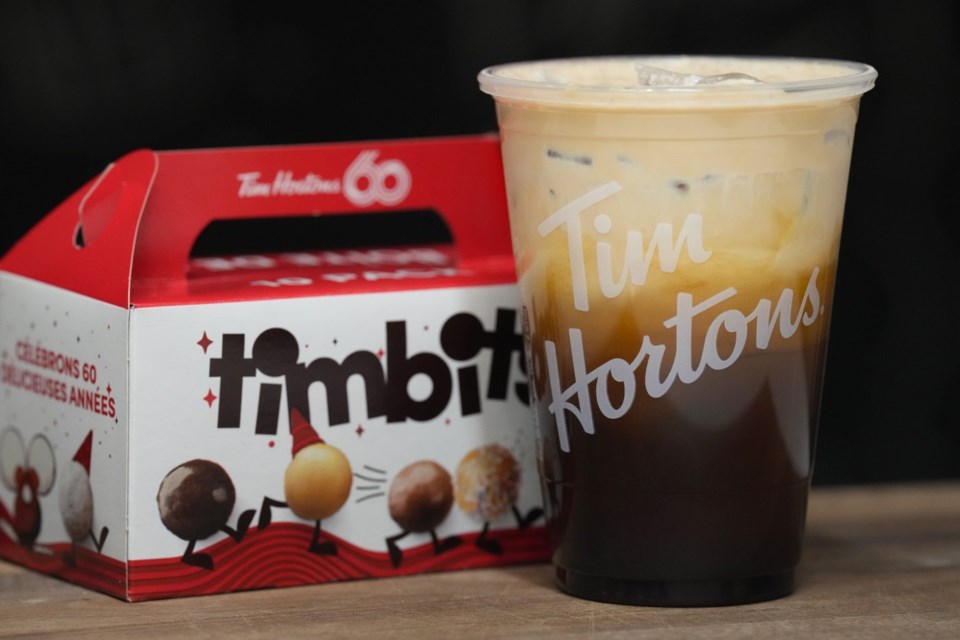The chief executive of Restaurant Brands International Inc. says he's seeing a rebound in consumer confidence after a slower start to the year.
"While the consumer environment remains dynamic, we've seen encouraging signs of improvement across many of our largest businesses," Josh Kobza told analysts on a conference call discussing the company's second-quarter results on Thursday.
The company said Tim Hortons and its international segment, which together make up 70 per cent of RBI's adjusted operating income, led the charge in the quarter.
"Tims posted its 17th consecutive quarter of positive comparable sales in Canada, and our international segment delivered another quarter of strong growth," Kobza said.
RBI reported Tim Hortons same-store sales increased 3.4 per cent overall and 3.6 per cent in Canada, specifically.
Kobza said sales were up in Tims' morning segment this quarter, thanks to its summer cold beverage lineup, filled Timbits and scrambled egg-based breakfast boxes.
The boxes were launched in a partnership with "Deadpool" actor Ryan Reynolds in April and helped drive 10 per cent growth in breakfast foods in the quarter.
At the same time, chief financial officer Sami Siddiqui said coffee prices also came down after hitting historic highs.
"This is welcome news for our Tim Hortons business, where coffee accounts for around 15 per cent of the commodity basket," he said on the same call as Kobza.
His remarks came as the company reported its second-quarter profit fell compared with a year ago.
The company, which keeps its books in U.S. dollars, reported net income attributable to common shareholders of US$189 million or 57 cents US per diluted share for the quarter ended June 30. The result was down from a profit of US$280 million or 88 cents US per diluted share in the same quarter last year.
On an adjusted basis, RBI earned 94 cents US per diluted share, up from an adjusted profit of 86 cents US per diluted share a year earlier.
Revenue for the company, which also owns Burger King, Popeyes and Firehouse Subs, totalled US$2.41 billion for the quarter, up from US$2.08 billion.
Siddiqui said RBI is keeping a close eye on beef prices, which make up a quarter of the commodity basket for Burger King in the United States.
Retail beef prices have hit record highs as abnormally dry weather hurts ranching areas south of the border. Ground beef rose to an average of US$6.12 per pound in June, up nearly 12 per cent from 2024. The average price of all steaks rose eight per cent to US$11.49 per pound.
"While elevated, this trend is largely driven by the cyclical nature of U.S. herd rebuilding," he told analysts. "We expect prices to normalize over time."
Comparable sales at Burger King in the U.S. were up 1.5 per cent, while Burger King overall saw comparable sales rise 1.3 per cent, both up from the same time last year.
The company's Burger King segment in China has also started to see positive results, Siddiqui said.
"I think that's a really remarkable turnaround that we've had in BK China," he said.
After buying back almost 100 per cent of the Burger King China business from TFI Asia Holdings BV and Pangaea Two Acquisition Holdings XXIII, Ltd. earlier this year for $158 million, RBI said it is now looking for new stewardship of its brand.
"With the right local partner, capital support and development plan, we see a clear path to reignite growth," Kobza said.
-- With files from The Associated Press
This report by The Canadian Press was first published Aug. 7, 2025.
Companies in this story: (TSX: QSR)
Ritika Dubey, The Canadian Press



